- Home
- catt dahman
Of Blood and Water: Campground Murders (Virgil McLendon Thrillers Book 1)
Of Blood and Water: Campground Murders (Virgil McLendon Thrillers Book 1) Read online
Of Blood and Water
A Virgil McLendon Mystery
catt dahman
© 2013, catt dahman
ALL RIGHTS RESERVED. This book contains material protected under International and Federal Copyright Laws and Treaties. Any unauthorized reprint or use of this material is prohibited. No part of this book, including the cover and photos, may be reproduced or transmitted in any form or by any means, electronic or mechanical, including photocopying or recording, or by any information storage and retrieval system without express written permission from the author / publisher. All rights reserved.
Copyright for hand drawn work by Kerry Martin. All rights reserved. May not be reproduced or altered except as a part of the cover for review. Used with permission of artist—2013.
ISBN-13: 978-1496050175
Thank you Nic for help with firearms.
Thank you Susan for the idea of playing the piano.
Dedicated to all the heroes in law enforcement: especially in memory of Sergeant Tom Anderson Sitton (d. May 24, 1996), Nacogdoches, Texas.
Chapter One: 1907
At exactly half past five o’clock in the evening and not one minute later, the doctor rolled his shirt sleeves up his arm to wash his face and shave, to scrub his hands while checking for chipped fingernails or torn cuticles, and to comb his thick, dark hair. His shirt’s cuffs, each pierced by a tiny cuff link of gold and a small, deep red ruby, were crisp and as clean as they had been that morning.
When he finished using the hot water in the basin, he carefully wiped his face and hands in that order and neatly folded the damp towel that he had set on the side of the basin. He set down a single lemon candy that was wrapped in cellophane for the hired girl as he did every few days to show appreciation and thoughtfulness.
Like the hot water the girl brought upstairs seven days a week, the towel would be taken away quietly so it would be as if it had never been left on the wash stand; she would come up silently and remove the used objects and lay out a fresh towel for the morning. When the lavender soap was too small for good lather, she would replace it. The water, brought twice a day, was always the same temperature.
With his crisp black jacket neatly brushed of lint and hanging on the coat rack in the bedroom where he had put it, he shrugged into an older jacket, a tweed, time worn, softly shaped, and comfortable. It was the jacket he preferred on chillier evenings. Each sleeve had a suede patch at the elbow, lovingly sewn into place so that not a single stitch showed to mar the fabric.
The bedroom was nicely cleaned. Because he abhorred clutter, only a few knick-knacks were about the room; instead, Virgilrdy, classic furnishings of rose-colored draperies with a silvery fabric at the tops, a beautifully woven Persian rug in burgundy and white, a few candles, and two lamps decorated the room whose walls were papered in a silver grey. A bed with a plain, embroidered silk spread in a shade of rose that the doctor liked, a washstand, twin armoires, nightstands, and the coatrack finished the décor.
Neatly dressed and clean, he walked down the stairs, trailing a hand along the polished banister, inhaling the scent of lemon wax. Not a bit of dust was in sight, and nothing was out of place, he approvingly noticed, while making his way to the dining room.
The room always seemed on the verge of glowing and was one of the doctor’s favorite places in the big house. The light came in the window at just the right angle, and candles burned in sconces; electric light would have ruined the ambiance of this room. With floors and furnishing of a honeyed-oak, ranging from deep bronze to a golden brown, they looked rich and warm. The walls were covered in a soft blue-violet silk with a low wainscoting and intricately carved crown molding of bleached oak. Drapes and cushions matched and were in a floral of violet and gold embroidery. White, silk shears fluttered blithely at the window, making the light gauzy.
His home was sensibly furnished with expensive, but limited items, and the silks were not a frivolity, but a show of bold color and classic taste. A person’s senses should be titillated for him to be well.
Nathan sat at the head of the table, his face slightly puzzled, inquisitive a little, but undaunted. It was a variance in the routine he had known for years that flummoxed him, this empty table. It wasn’t bare. It was set with crisp mats of blue linen, and matching linen napkins were neatly folded into holders of brass dragons that bit their own tales. The plates of white china bordered with tiny lilacs were in place with the water goblets and wine glasses. He took pride in a well-set table.
The children, after having set the table as always, sat in their places awaiting dinner, just as they did each evening; they had clean faces and hands and neatly combed and brushed hair. Each was dressed properly as befitted his age, not formally, but with clothing tucked in, smoothed, sized suitably, and in style serviceable and not silly. Each night, he checked to be sure each child was respectfully dressed for dinner.
But it was five minutes after six, and not a steaming dish sat on the table waiting to be served. Nothing was waiting to be eaten. He looked to the children, a little more interested now. None of the four children betrayed a glimmer of importance but waited patiently, with eyes lowered, hands in their laps, and feet still beneath the table.
The doctor thought that the children were, indeed, very curious as to why the norm was changed, but they were clever tykes and betrayed nothing on their little faces. He saw a twitch here and a tightening of the lips there.
Bernice, the doctor’s wife of many years, brought in a dish of glistening, buttered carrots in one hand and a bowl of baked beans in the other; both smelled delicious.
She smiled at her husband, smoothed the almost-spotless apron over her blue dress, and went back and forth from the kitchen to the dining room, bringing bread, wine, water, a dish of freshly creamed corn, and an herb roasted hen, all of which she set on the table.
Some nights they had a large dinner with a pork roast or beefsteaks, and some nights Bernice served big sandwiches with homemade pickles and fruit, or casseroles and bread. The doctor wasn’t opinionated on what was served because Bernice always made wise choices that were nutritious and tasty.
Nathan took each plate as it came around and filled it from his end of the table with the meat and vegetables while the rest allowed Bernice to finish the servings by setting buttered bread onto each plate.
Everyone waited until the doctor had said grace before beginning to eat. Bernice was an excellent cook and devoted herself to her meal each night as the girl who helped out around the house heated water for the doctor’s routine and ironed endlessly.
“Homework finished?” Nathan asked Elizabeth, just as he did each night.
“Yes, Daddy.”
“And piano practice?”
“A full two hours, Daddy.”
“And how did we do on the math test?” he asked. He noted Elizabeth’s hair was shining, brushed back into a braid and that her blouse was tidy and clean. He nodded to her with approval.
“I made a hundred percent, Daddy.”
“Good. But don’t rest on laurels. Study twice as hard for the next one,” Nathan cautioned. Each night he imparted some warning or a challenge to his eldest daughter; sometimes he suggested extra reading material or some bonus work, and each night she agreed and did as he asked. “An hour is good, but a few extra minutes could benefit you.”
“Yes, Sir,” she said as she involuntarily wiggled her fingers, still feeling the notes and the keys as she played; she was aware that she had no talent for the piano, but she was smart, dedicated, and practiced endlessly. She
hated the piano.
“Joseph, how did we do on the history paper?”
“I made an A+.” Joseph didn’t add that his was the highest marked paper in his class; that would be bragging and would earn a stern frown. His father was a respected, intelligent, learned physician, but that didn’t mean the doctor stopped reading papers, attending lectures, and learning. There was always room for improvement.
“Your hair is getting a bit long. We’ll have that cut this week. Your part is off. Have more pride in caring for yourself, Joseph.” Nathan looked at his oldest son sternly, pointing to the hair part that was a fraction uneven.
“Yes, Sir.”
Mary Agatha, only ten, told her father when asked that she made an A on her spelling test and spelled out the three words he quizzed her on, showing that it wasn’t a fluke, but that she knew her spelling. She beamed as she spelled each word; spelling was easy for her, and she enjoyed it. He tried another word, and she snapped her mouth closed. She tilted her head and replied, “I’ve never heard that word.”
“It’s Greek. There’s a lesson here, Mary Agatha. Never assume you have mastered anything as there are more words and languages than you can imagine. As a physician, I studied Greek and Latin. However, I do like your hair pulled back that way and off your forehead. You look far more intelligent and healthy.”
“Yes, Sir. Thank you, Sir.” She beamed, a bit unsure how she felt about missing an unknown word but glad he praised her.
Aaron, eight years old, dutifully explained the American government when asked. He nodded as his father nodded with support. While his brother and sisters sought their father’s approval, Aaron learned a lot because he enjoyed it, but his hair was often messy, his cuffs were dirty, and his hands were not always the cleanest. He was always upbraided for that every evening, and sometimes he was spanked with a belt that left welts, but Aaron figured all the beatings in the world would never make him perfect; he was glad.
Nathan lectured Aaron as always. Aaron nodded, but he wouldn’t do much better the next night.
Nathan was a doctor by occupation, but he took a strong interest in his children’s studies and behavior. He had high hopes; he thought Aaron was by far the one who would do best in the future.
“And Mrs. Doctor Gaither, how are you?”
“Good, thank you. Doctor, how is your roasted hen?” She saw, as always, he took precisely half of a breast, leaving her the other, half each of the other breast for the oldest children, and a leg and wing each for the youngest. He seemed to prefer the carrots and corn this evening.
“A little dry, Mrs. Gaither, but palatable. Did your reading group gather today?” He ate the beans, savoring the sweet maple, and used his bread to push the creamed corn onto his fork. As always, the vegetables were cooked perfectly, and they were the building blocks of good nutrition.
“Yes, Doctor,” said Bernice as she thoughtfully chewed a carrot. The conversation was the same as every night, and the children had done well in school; all seemed well. Teachers and other parents always bragged on how well Bernice’s children did in their school work, and their behavior was stellar, an excellent reflection on their parents. She made sure they did as they were asked: washing and making themselves tidy for dinner.
But something was not right.
Nathan ate well and was as well mannered as always, pouring the wine for her and filling her water glass from the pitcher. He asked about her reading group; that was it. He didn’t ask what they discussed or found thought provoking. He didn’t question her. It made her nervous all at once.
“Elizabeth, you have a paper due in a week. How is that coming along?”
“I’ve finished it, Daddy.”
“Be sure to check it over again, and don’t assume it is done. I’d like to read it.”
“Yes, Sir.” Elizabeth dared to ask for seconds of carrots and smiled as her father nodded consent.
“How was your day, Doctor?” Bernice asked.
“I had a few interesting cases. The day was quite relaxing, today was, until I returned home after a day of hard work and found this,” he said as he spread his arms.
“This?”
“Chaos and a late dinner.”
“I was a little late with dinner,” Bernice said, “I burned my arm, see? I’d like for you to dress it properly, later, Doctor, if you wish.” Bernice was unsure how this conversation should go. She had brushed against the pan that she had cooked the hen in, blistering her forearm badly. The time that she took to run cold water over her arm had made dinner late to the table, but the pain had been almost unbearable for several minutes. She had been five minutes tardy, but the doctor thrived on attention to details and time.
“One should plan for unforeseen circumstances. Measure out your allotted time. Isn’t that so, Elizabeth?”
“Yes, Daddy,” Elizabeth looked up and genuinely took interest in something besides her plate of half-eaten dinner. Her answers, truthful, had shown her father that she had studied diligently and applied herself; she could add that she finished her math test with a quarter hour to spare, but she didn’t think it mattered now. Her eyes darkened suddenly with concern.
Her mother’s arm was blistered badly, the little pustules filled with fluid and were about to burst, and her face was a tight mask of pain and control. And was that a flicker of fear? Was it a hint of concern and defense? Elizabeth ate quickly, finishing her meal, and wishing time, her ever foe, would speed and allow her the safety of her room and autonomy.
Elizabeth was scared.
The doctor filled a third glass with the claret, swallowing it quickly, “Is it too much to ask that after a day of hard work, I be allowed to come home and enjoy a meal on the table? I was here on time. I was prepared. Mrs. Gaither, how is it you were not on time?”
“It was the burn. I was prepared. I apologize, Nathan. It was only a few minutes….” Bernice saw her children staring at their plates as they gulped their food, hurrying to be excused, and praying to avoid the storm that approached.
They could feel the ice winds and the fury that were rising.
“Elizabeth….” Bernice didn’t know what to say. She wasn’t sure how big this tempest was.
“All I ask is dinner to be on the table,” Nathan roared. The emptied bottle of claret flew down the table as a missile, cracking the dish of carrots so they flew all over the table, splattering everything on the table. Mary Agatha’s almost-empty glass of milk shattered and flew at Joseph, who ducked the projectile. Baked beans sailed as the bowl broke into shards, breaking more of the dishes. The wine bottle bounced off the table and onto the floor.
Bernice hesitantly reached for a piece of glass, grasping it and then letting it go, watching as the thin line on her finger gaped and ran red with her blood. She left the glass where it was, wondering vaguely how much china and crystal were lying in shards.
Nathan was on his feet and striding across the room.
It had been a year since anything had gone wrong. Two years were gone since Nathan had hit one of the children other than the whippings. A broken arm that time, but it was long ago. Joseph was rubbing that arm as he stared at the broken dishes and tried to disappear into the chair.
Bernice felt her nose burst as Nathan slammed her head against the table, covering the wood with bright red. She stretched her arms wide in a show of surrender, like bare wings outstretched, making sure Nathan saw she was not fighting back or defending herself; he would beat her almost to death if she did either. Her friends already thought she was the most clumsy, silly thing on earth with her plasters and bruises.
The front of her dress ripped as he jerked her to her feet and held her face to face with him and backhanded her so her lips were torn. He hit her in the eye, and her brow split.
In a second, he groaned and leaned on Bernice to support him as his eyes rolled. Face flushed, he motioned Elizabeth and Mary Agatha to get busy. “Clean it up, Mrs. Gaither. Clean it all up. And, then, it was over cooked and dry.”
>
Joseph and Aaron meekly stood at the doorway, not daring to leave the room until dismissed. Their father searched their eyes for the slightest sign of sympathy or compassion over the mess that was his favorite room in the house and that would take all night to clean. He silently dared the females to leave the slightest stain in the room.
There would be no stains. There would be no wasting of time.
“Go to your rooms, boys. Bernice, let me see that burn. Ahhh. It’s painful, yes? It’s a five percent according to what we learned after the Boston fire, but it’s a second degree. Your age is good, and you are of good health. That all benefits you,” said Nathan, and as he spoke, he had Elizabeth bring his bag and few implements. He gently cleaned the burn with the softest, most gentle hands imaginable, frowning with pity when, in his cleansing procedure, he caused pain to his wife. He muttered compassionate endearments, lost in the trance of healing.
“Oh, your poor flesh. Look how blistered, and it must hurt. This cream will soothe the pain, I promise, Bernice.”
“Thank you.” The sting and heat left the wound as he applied the cream gently.
His bedside manner as the most caring of doctors was what made every patient love Nathan. Not one person would say or believe a bad thing about the man; he was charismatic and beloved. Dr. Gaither could mend any wound, deliver a baby with ease, and fix a broken bone like new.
It was too bad he was also a monster.
Once Bernice’s wounds were cleaned and dressed, Nathan nodded and left the room. She smiled softly at her daughters and set her mind to cleaning the mess. She would do a wonderful job and scrub her hands raw, but she would make Nathan so very proud of her.
Chapter Two: 1963
Aaron Gaither, having been asked about the incident, would recall the details fluidly, in shimmering images, and, not quite aware of anything but that glass broke and his father, a doctor, dressed his mother’s wounds soothingly. He remembered how kindly his father spoke as he treated the injuries, the epitome of a smart, country-mannered doctor with a healing touch and a compassionate ear.

 Z Poc: The Lodge
Z Poc: The Lodge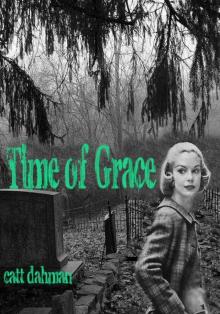 Time of Grace
Time of Grace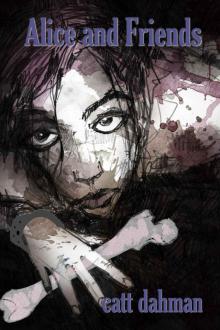 Alice and Friends
Alice and Friends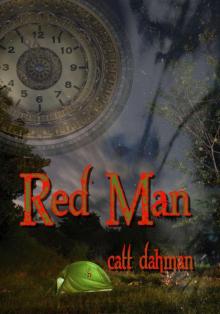 Red Man
Red Man George's Terms: A Zombie Novel (Z Is For Zombie Book 1)
George's Terms: A Zombie Novel (Z Is For Zombie Book 1)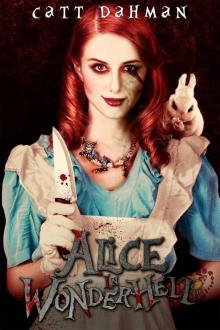 Alice In Wonderhell
Alice In Wonderhell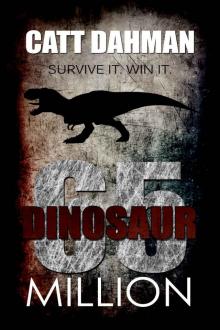 Dinosaur: 65 million
Dinosaur: 65 million Extinction Island 2
Extinction Island 2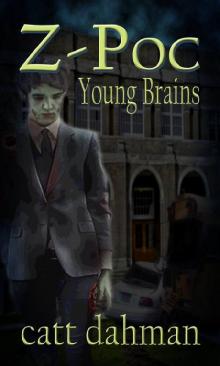 Z Poc: Young Brains
Z Poc: Young Brains Of Guilt and Innocence: Institute at the Criminally Insane (Virgil McLendon Thrillers Book 3)
Of Guilt and Innocence: Institute at the Criminally Insane (Virgil McLendon Thrillers Book 3) Smooth
Smooth Extinction Island
Extinction Island Of Lost and Found (the Kingsborough House): Kingsborough House (Virgil McLendon Thrillers Book 4)
Of Lost and Found (the Kingsborough House): Kingsborough House (Virgil McLendon Thrillers Book 4) Titanic 1912: A Lovecraft Mythos Novel
Titanic 1912: A Lovecraft Mythos Novel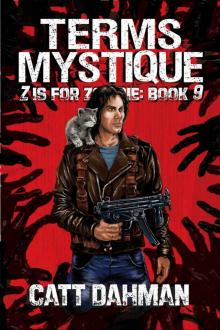 Terms Mystique: Z Is For Zombie 9
Terms Mystique: Z Is For Zombie 9 Wild Boys: Six Shooters and Fangs
Wild Boys: Six Shooters and Fangs When We Were 8
When We Were 8 Louisiana Saturday Night
Louisiana Saturday Night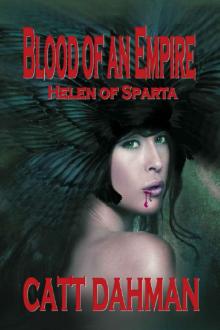 Blood of an Empire: Helen of Sparta
Blood of an Empire: Helen of Sparta Rage: Z Is For Zombie Book 5
Rage: Z Is For Zombie Book 5 Devil's Details: Z Is For Zombie Book 4
Devil's Details: Z Is For Zombie Book 4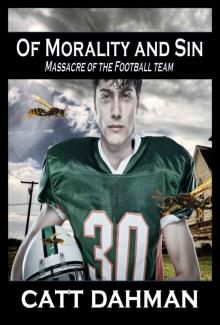 Of Morality and Sin: Massacre of the Football Team (Virgil McLendon Thrillers Book 7)
Of Morality and Sin: Massacre of the Football Team (Virgil McLendon Thrillers Book 7) Shadow Of Doubt: Z Is For Zombie Book 3
Shadow Of Doubt: Z Is For Zombie Book 3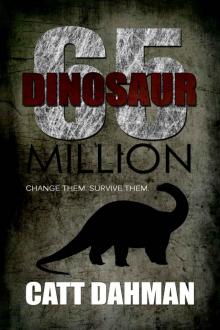 Dinosaur: 65 Million: Book 2 Change Them, Survive Them
Dinosaur: 65 Million: Book 2 Change Them, Survive Them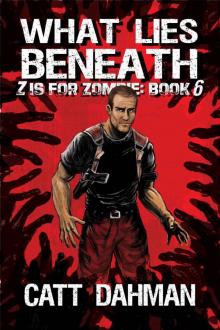 What Lies Beneath: Z is for Zombie Book 6
What Lies Beneath: Z is for Zombie Book 6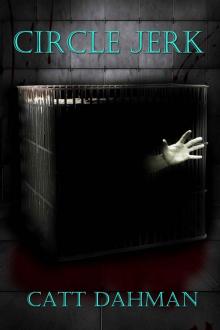 Circle Jerk
Circle Jerk The End of the Road: Z is for Zombie Book 8 (Z is for Zombie: Book)
The End of the Road: Z is for Zombie Book 8 (Z is for Zombie: Book)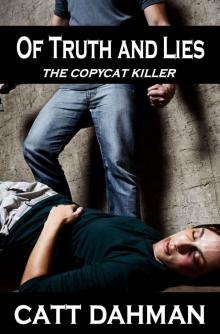 Of Truth and Lies: Hollingsworth Copycat Killer (Virgil McLendon Thrillers Book 5)
Of Truth and Lies: Hollingsworth Copycat Killer (Virgil McLendon Thrillers Book 5)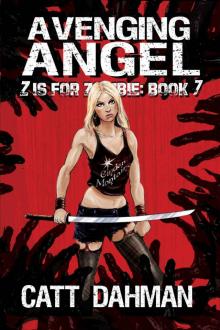 Avenging Angel: Z is for Zombie Book 7
Avenging Angel: Z is for Zombie Book 7 Event Horizon: Z Is For Zombie Book 2
Event Horizon: Z Is For Zombie Book 2 Of Blood and Water: Campground Murders (Virgil McLendon Thrillers Book 1)
Of Blood and Water: Campground Murders (Virgil McLendon Thrillers Book 1)